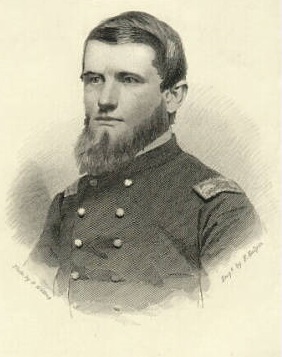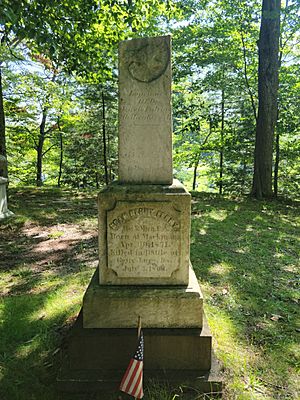Noah Henry Ferry facts for kids
Quick facts for kids
Major Noah Henry Ferry
|
|
|---|---|
 |
|
| Born | April 30, 1831 Mackinac Island |
| Died | July 3, 1863 (aged 32) Gettysburg, Pennsylvania |
| Buried | |
| Allegiance | United States |
| Service/ |
Union Army |
| Rank | Major |
| Unit | 5th Michigan Cavalry Regiment |
| Battles/wars | Battle of Gettysburg |
Noah Henry Ferry was a brave soldier who served as a Major in the Union Army during the American Civil War. He was part of the 5th Michigan Cavalry. Major Ferry sadly lost his life during the famous Battle of Gettysburg in 1863. He was born on April 30, 1831, and died on July 3, 1863.
Contents
Early Life and Family
Noah was born in 1831 on Mackinac Island, Michigan. His parents were Rev. William Montague Ferry and Amanda White Ferry. He was their fourth child. His older brothers also became important people. One brother, William Montague Ferry Jr., was a Colonel in the Union Army. He later became a politician. Another brother, Thomas W. Ferry, became a U.S. Senator.
The Ferry family first lived at a Presbyterian mission on Mackinac Island. Here, Noah's father helped Native American communities. In 1834, the family moved to Grand Haven. In Grand Haven, the Ferry family started many successful businesses. They worked in lumber, iron, shipbuilding, and banking.
Before the War
When Noah was just 23 years old, he took charge of the Ferry and Sons Sawmill. This sawmill was located in White River Township, Michigan. Noah became the wealthiest person in the township. He was also the biggest employer there.
Joining the Civil War
During the American Civil War, Noah decided to join the fight. He gathered 102 men, many of whom worked for him. They formed a group called the "White River Guard." The men chose Noah to be their commander.
This guard then joined other groups. Together, they became the 5th Michigan Volunteer Cavalry. Noah Ferry was made a Major in this new regiment. The regiment traveled to Virginia to fight. There, they met up with other Michigan cavalry groups. These groups were known as The Michigan Cavalry Brigade.
Challenges in Battle
Fighting in the war was very tough for The Michigan Cavalry Brigade. There were many difficult moments. At one point, the leader of the Brigade, Colonel Freeman Norvell, was not performing his duties well. Major Ferry bravely stepped forward. He demanded that Colonel Norvell give up his command.
Major Ferry succeeded in his challenge. Colonel Norvell resigned from his position. Major Ferry was then offered the role of Colonel for the Brigade. However, he turned down the offer. He felt he had not yet earned such a high position.
Death at Gettysburg
When Major Ferry and his men arrived at the Gettysburg Battlefield, they knew this battle would be different. It was going to be a huge fight. While waiting for help from Brigadier General George Armstrong Custer's soldiers, Major Ferry led 200 cavalrymen into battle. These men were fighting on foot, not on horses.
Just before he was shot, Major Ferry famously shouted, "Rally boys, Rally for the fence!" He was shot in the head and died instantly. This happened during the intense fighting of the Battle of Gettysburg.
Legacy
General Custer wrote about the loss of Major Ferry in his official report. He called him "The brave and chivalric Major N. H. Ferry." This shows how much he was respected.
Colonel Russell Alger knew Major Ferry and his family well. Colonel Alger was with Major Ferry on the day he was killed. Alger wrote that Major Ferry's death made everyone in the Brigade very sad. He said Major Ferry was a "gallant soldier" and a "great blow" to lose.
Colonel Alger also wrote that Major Ferry wore his uniform because he believed it was his duty. He gave up his wealth, his home, his dreams, and even his life for the Union cause.
Major Ferry's body was first buried under a tree on the battlefield. Soon after, his father, William Montague Ferry, and his brother, Thomas W. Ferry, went to get his body. They brought him back to Grand Haven. He is buried in the Ferry family plot at Lake Forest Cemetery.
Even though he is buried in Grand Haven, Major Ferry has the first stone in the Michigan section of the Gettysburg National Cemetery. This shows his importance.
In Montague, Michigan, the main street is named Ferry Street to honor Noah. Ferry Church in Montague is also named after him.
 | John T. Biggers |
 | Thomas Blackshear |
 | Mark Bradford |
 | Beverly Buchanan |


